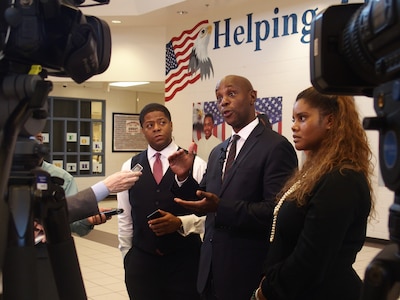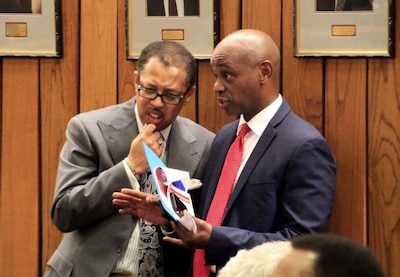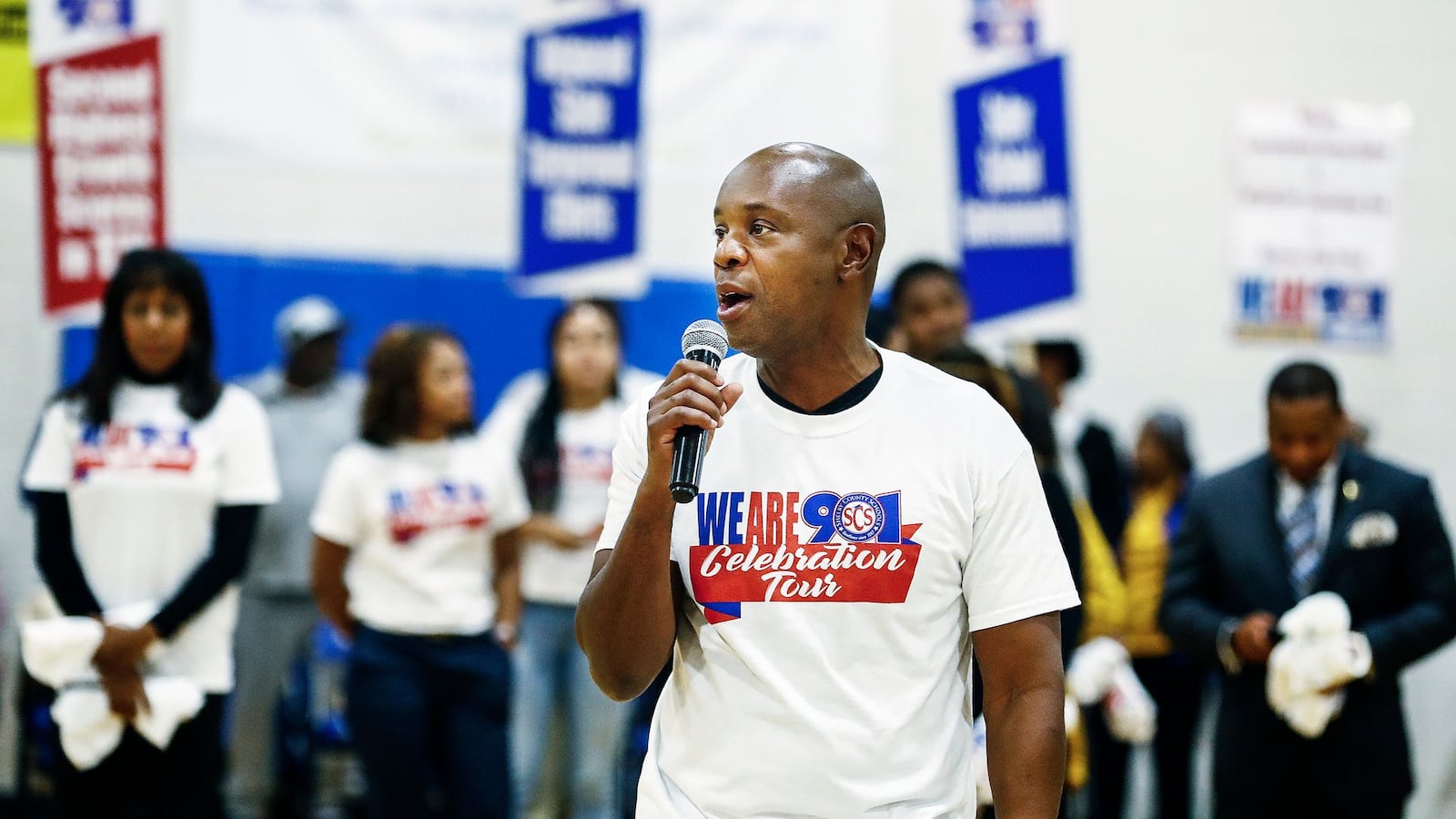Dorsey Hopson recently went on a victory lap.
In late October, he and other Shelby County Schools top officials traveled around to a half dozen schools that highlighted different successes in the district under Hopson’s leadership as superintendent. The tour touted the district’s Innovation Zone program created to boost test scores, a switch to a budget system that allocates money based on student need, the transformation of a historic high school into an all-specialty program, and improved school safety.
“[When we designed this tour], we reflected on the five years since the de-merger,” Hopson said the day of the #WeAre901 event. “Some thought the school district wouldn’t survive that. Now, we have a lot to celebrate.”
What Hopson didn’t say then is that the event was acting as a curtain call. Just a few weeks later, Hopson announced that he is stepping down as superintendent of Tennessee’s largest school system effective Jan. 8 for a job at health care giant Cigna.

Hopson is leaving the district better than he found it, he told reporters in a crowded conference room on Tuesday as he announced his resignation. And there are significant milestones to back up that claim, as the district has steadied financially, gains have been made academically, and student enrollment has ticked up after years of dropping.
“Everything happens for reason,” said board member Stephanie Love. “The superintendent, he was here for a season and that season has ended. When the superintendent was named superintendent, where we are today is a whole lot better than where we were when he started.”
Hopson was named the first leader of Shelby County Schools in 2013 after the historic merger of city and county schools. His appointment followed the resignations — and accompanying $300,000 buyouts — of superintendents Kriner Cash for the city district and John Aitken for the county district. At the time, the new unified school board couldn’t agree to keep either superintendent.
With months before the start of the new school year under the unified school system, the board conducted a national search but came up empty. Several superintendent candidates were leery of the job because of all the uncertainty of the new district. Hopson, a former attorney for Memphis City Schools who was already serving as acting superintendent, was tapped for the job. Though he had served as legal counsel for districts in Memphis and Atlanta, he was the first superintendent who had not been an educator. The board approved him unanimously.
Hopson was officially in the post for five and a half years – the average time that most big-city superintendents stay on the job. The last three superintendents before him averaged about four years, though former Memphis mayor and city school superintendent Willie Herenton held the job 12 years.

Van Turner, a Shelby County commissioner of four years, said Hopson was the “right leader for the district at a very fragile time.” The county commission is the funding body of Shelby County Schools, and Hopson had to work closely with commissioners as he took the district from a $50 million deficit to investing more than $60 million in pay raises.
“I think he was well suited for the role he played, especially in having dealt with the legal issues at the time with the historic merger and demerger,” Turner said. “Going forward, I thought he hired a good team to surround him and assist him with the district’s academic issues.”
Stabilizing the merged district financially was not a small feat – and Hopson said during his resignation speech that improving the financial footing was one of the accomplishments of which he was most proud.
“When we merged in 2013, the question was: Is school going to be open?” Hopson said. “We went from a $100 million structural deficit in two years to working with surpluses.”
While financially the district has improved, test scores still lag for Shelby County students compared to state averages. Hopson acknowledged that the district has far to go in boosting student academics.
“Our student outcomes aren’t where we want them to be and we have a lot of great principals, a lot of great teachers working to make it happen every day,” Hopson said on Tuesday. “I can walk away knowing this district is in much better shape than it was when I started, but also know that we have a long way to go.”

Yet, in one of the most notable achievements in the five years since becoming a new district, Shelby County Schools has gone from being Tennessee’s problem child to poster child when it comes to boosting test scores at schools in low-income neighborhoods.
That’s mostly because of the district’s program Innovation Zone, which started in 2012 and has absorbed about two dozen schools and turned them around by adding an extra hour to the school day, incentivizing teachers, adding more professional development, and providing non-academic resources such as clothes closets.
The iZone schools have been cheered as a more effective model for school turnaround by policymakers and researchers than that of the state-run Achievement School District, which started taking over Tennessee’s lowest-performing schools – the majority of which were in Memphis – at the time Hopson was transitioning to power. Sharon Griffin championed the iZone under Hopson, but left the district in June to lead the struggling Achievement School District.
“I deeply appreciate Superintendent Hopson for the tremendous work we accomplished during our six years together with Shelby County Schools,” Griffin said. “Under his leadership, iZone schools became a national proof point in school turnaround.”
Newly elected county Mayor Lee Harris also praised Hopson for his work in school turnaround.
“Mr. Hopson showed great leadership during the transition of the school system, a difficult and long process that was truly unique in education,” Harris said. “Furthermore, since the transition, Mr. Hopson was able to bring dozens of legacy Memphis City Schools off the state watch list and expand and modernize school choice, just to name a few of his accomplishments that directly impacted families.”
Hopson addressed during his remarks that inter-generational poverty makes the work of teaching and learning incredibly difficult – and that it takes partnerships outside of schools to get the work done. Over the years, Hopson had, at times, tenuous relationships with community partners and advocates. But most of those relationships are ending on a high note.
When the parent advocacy group Memphis Lift launched three years ago, its leaders were met with skepticism and suspicion from Shelby County Schools over perceived ties to the state-run school district. Last year, Hopson and Memphis Lift locked arms at an event as Hopson spoke of “an undeniable correlation between parental involvement and achievement.”
Tikeila Rucker, president of the United Education Association, described the group’s relationship with Hopson as positive, adding, “he has had an ear for teachers.”
Campaign for School Equity’s executive director Mendell Grinter released a statement saying, “Superintendent Hopson is the embodiment of service to home and community. We’ve admired his leadership and ability to work hard for the many students and families in our region.” His organization runs student advocacy and leadership programs in Memphis schools.

As reactions pour in about Hopson’s legacy, a large focus is also already being placed on what kind of leader the Shelby County Schools board will select to replace him.
Sarah Carpenter, executive director of the Memphis Lift, said she hopes parents have a seat at the table.
“Parents should be part of the conversations about who will lead our schools next,” Carpenter said. “Too many of our kids are still trapped in failing schools and being left behind, so our next superintendent has to be willing to work with parents to do better for our kids.”
Memphis needs to hire someone who can continue and expand Hopson’s work, said Terence Patterson, leader of Memphis Education Fund, a major philanthropic contributor to education. (Memphis Education Fund supports Chalkbeat. Learn more about our funding here.)
“Our organization is excited about the future direction of the district and optimistic the Board and community will select a world-class superintendent,” Patterson said. “We believe the next leader should have a keen understanding and appreciation of the greater Memphis area, experience obtaining student achievement gains for all children and a commitment to transformative learning environments that support the diversity of needs of all learners.”
Reporter Laura Faith Kebede and Bureau Chief Jacinthia Jones contributed to this report.

